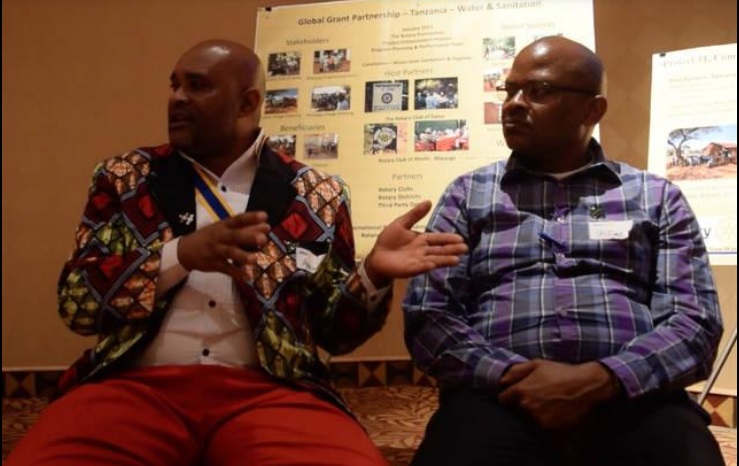
After multiple trips to Tanzania to build water systems, Ames Rotary (Iowa, US – D 6000) Global Grant Team Chair Gerald Klonglan knows there is only so much he can tell about the projects and his experience, which is why he was happy two Tanzanian Rotarians were able to make the trip to Ames this week to talk about the impact these water projects have had on their home country.
“What we’re doing, it is not charity, where you give some food here and some clothes there. We’re really building a community,” Klonglan said.
Rotary Club of Same President Amon Noel Mchomvu and Project Programme Manager Gilead Mkumbwa made the trip of more than 8,000 miles this week to talk with Rotarians at the Gateway Hotel.
“It’s our role to preach the goodness of Rotary,” Mkumbwa said.
“We need to advocate, raise awareness, and we need to publicise.”
According to Klonglan, both Mchomvu and Mkumbwa were also supposed to speak at the annual Rotary International Conference in Toronto, Canada this week, but their visas were denied by the Canadian government.
Klonglan said he did not know why specifically their visas were denied, but both men were in North America to talk about the success of the water systems in their region with all of the Rotary clubs that helped work on their projects.
Klonglan said the Rotary Foundation of Ames — as well as groups from other cities across Iowa, and in Hudson, Wisconsin and South Pasadena, California — have partnered with the Rotary Club of Same (pronounced Sah-may) in Tanzania, to install two water systems in the villages of Kigogo (2014-15) and Massandare (2016-17), and have recently installed a third water system in the village of Mhezi (2017-18).
According to Klonglan, today, each of the projects cost around $250,000, whereas just five years ago, the maximum allotted for projects was just $25,000.
Both Mchomvu and Mkumbwa said money has been the primary setback in keeping these projects going.
“We’ve had water projects in the area, but not for this amount of money,” Mchomvu said.
“We are given an opportunity by our district and international partners, but (we thought), ‘How are we going to handle such a huge water project?’”
In total, Mchomvu said within the Kilimanjaro region of Tanzania, through the Rotary Global Grant programme, there have been five total water projects.
Each one of the projects now includes a deep well, electrical service, storage tank and distribution points, as well as a watering hole for livestock.
In the case of the Mhezi project, the Rotary Foundation is looking to tap into a mountain spring rather than dig a well.
According to Klonglan, most Rotary clubs in Tanzania have existed since 2009, and since then he said he has visited the country in 2011, 2013 and 2014 with the Rotary Club of Ames.
Mchomvu said he has seen the number of Rotarians in Same decrease by over half in the past decade.
Currently, Mchomvu said he has 14 members and he hopes that receiving more international attention will help attract more members.
“We have almost 130 clubs (between Tanzania and Uganda), but among those numbers, at least 105 are in Uganda,” Mchomvu said.
“We have challenges, but we need the time to grow to address the benefit of people joining Rotary. Because we have to ask people.”
This week was the first time in Ames for Mchomvu and Mkumbwa, who said they were just appreciative of the opportunity to come and speak about what Rotary has done for their region and why the work must continue.
“By doing good things in the community, this also will attract many to join us,” Mchomvu said.
“We are a small club by number, but the number doesn’t matter. I think what matters is what we are doing.”
Source: Ames Tribune





